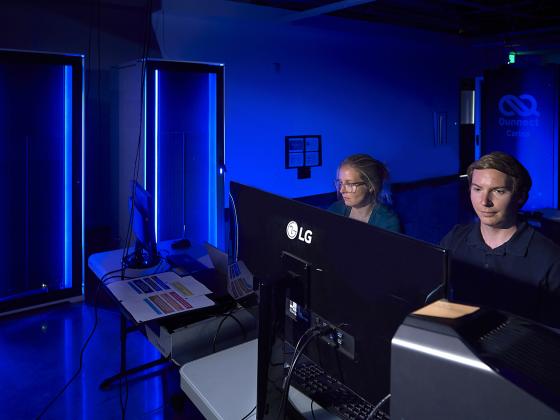BOZEMAN — Montana State University is positioning itself at the forefront of quantum computing research with the opening of its QCORE facility later this month, backed by $44.7 million from the U.S. Air Force Research Laboratory and partnerships with around 60 organizations.
The Quantum Collaborative Research and Education facility, housed in a 12,600-square-foot space at MSU’s Innovation Campus, will celebrate its launch with a three-day Grand Challenges in Quantum Systems Summit beginning Aug. 20, followed by a public open house on Friday, Aug. 22.
“We’re leading Montana’s transformation into a global powerhouse for quantum-enabled technologies by 2035 by fostering economic growth, academic excellence and developing a resilient, future-focused workforce,” said Jayne Morrow, QCORE’s director. “These capabilities are not just for research. These investments create entirely new computing and networking infrastructure for the state of Montana.”
Military Partnership Drives Innovation
The facility emerged from a $26.7 million Air Force Research Laboratory grant awarded to MSU in 2023, with an additional $18 million supporting the university’s Spectrum Lab photonics research. The military investment reflects the strategic importance of quantum computing for national defense applications.
Michael J. Hayduk, deputy director of AFRL’s information directorate, will deliver a keynote address at the opening summit, which will feature more than 25 speakers from industry and academia worldwide, plus participation from around 35 companies and organizations.
The funding purchased specialized equipment to test quantum components in extremely cold operating environments, establishing MSU as a unique research destination. According to Morrow, MSU is the world’s first university to house a Rigetti Novera superconducting quantum computer on-site and the first U.S. university with an ORCA photonic quantum computer.
Rare Quantum Computing Hub
QCORE represents one of only seven organizations worldwide housing two different types of quantum computers – photonic and superconducting. The facility also operates one of only five quantum network test beds globally, combining traditional and quantum networking capabilities.
“These are challenging technical hardware issues, and that requires technical hardware solutions. Montana State University and QCORE are uniquely well-suited to help Montana’s industry address them,” Morrow said.
Quantum physics involves manipulating particles smaller than protons and neutrons to create faster, more sensitive and more secure systems for electronics, sensors, computers and medical equipment. Scientists at MSU’s Spectrum Lab and MonArk Quantum Foundry are working to overcome key challenges including component size and energy consumption.
Community Outreach and Workforce Development
Beyond research applications, QCORE aims to connect quantum technology with Montana communities through comprehensive educational programs. The facility has distributed quantum kits to more than 70 schools statewide, providing teachers with resources to introduce students to quantum systems.
“We also understand it’s important to connect this emerging field of quantum with the opportunities in our local communities around Montana,” Morrow said. QCORE has also supported artists across the state in creating “Sunprints,” which harness quantum mechanics to generate images.
The facility serves as both research center and business incubator, with signed partnerships or memoranda of understanding with 15 companies. Over two decades, MSU has helped establish a network of photonics and cryogenics companies around Bozeman, creating a foundation for quantum technology commercialization and workforce development.
MSU senior Jack Schnepf created a painting installation titled “The Shape of Uncertainty” specifically for the QCORE facility, reflecting the intersection of art and quantum science.
Looking Ahead
The opening summit will feature panel discussions addressing quantum systems challenges where MSU’s ecosystem can drive solutions. Jacob Taylor from the University of Maryland’s Institute for Advanced Computer Studies will join Hayduk as a keynote speaker.
“The purpose of the summit is to unite with partners and stakeholders from around the world to identify and address the grand challenges in quantum systems where MSU’s ecosystem can uniquely drive solutions,” Morrow said.
The public open house runs from 3 to 6 p.m. on Friday, Aug. 22, at the EngineWorks building, 2425 Technology Blvd., and is free to attend.
